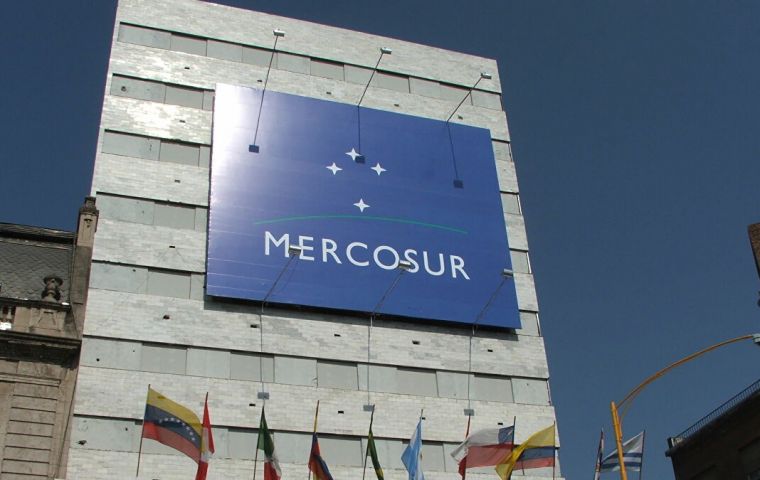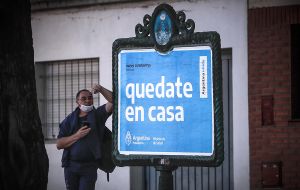MercoPress. South Atlantic News Agency
Mercosur: Argentina only interested in block's negotiations with Europe
 “The Argentine Republic has announced the decision to stop participating in the negotiations for ongoing trade agreements and future bloc negotiations,” the Ministry of Foreign Affairs of Paraguay ann
“The Argentine Republic has announced the decision to stop participating in the negotiations for ongoing trade agreements and future bloc negotiations,” the Ministry of Foreign Affairs of Paraguay ann  Argentina will give priority to its domestic economic policy, aggravated by the COVID-19 pandemic, but ”this will not be an obstacle for the other States Parties to proceed with the various negotiatin
Argentina will give priority to its domestic economic policy, aggravated by the COVID-19 pandemic, but ”this will not be an obstacle for the other States Parties to proceed with the various negotiatin In the midst of the chaotic situation caused by the pandemic, the Argentine government announced the abandonment of Mercosur negotiations to prioritize the country’s domestic economy and the struggle against the virus. The rest of the bloc members must evaluate legal, institutional, and operational measures emerging from the decision.
Paraguay, in the exercise of the rotating presidency of the bloc, announced the Argentine decision transmitted to the coordinators of each country through a videoconference, held on Friday.
“The Argentine Republic has announced the decision to stop participating in the negotiations for ongoing trade agreements and future bloc negotiations,” the Ministry of Foreign Affairs of Paraguay announced in a note.
“Argentina reported that it has adopted this measure to meet the priorities of its domestic economic policy, aggravated by the COVID-19 pandemic, and indicated that it will not be an obstacle for the other States Parties to proceed with the various negotiating processes,” adds the note.
Currently, Mercosur has advanced negotiations with Canada, South Korea and Singapore, but it also wants to move forward with Japan and start negotiations with the United States. Likewise the implementation of the accord signed with the European Union.
However, the Argentine stance can complicate the objective of the other members of the bloc. Under current Mercosur rules, all countries need to approve a decision together without one being able to move forward alone. In trade negotiations involving tariffs, all countries must negotiate together and reach understandings by consensus. The absence of one, in practice, hinders everyone’s negotiations.
“The Pro-Tempore Presidency of Paraguay and the other Mercosur States Parties will evaluate the most appropriate legal, institutional and operational measures” so that “the withdrawal of Argentina from the negotiations does not affect community integration”, states the statement from Paraguay.
Regarding the free trade agreements signed last year with the European Union and the European Free Trade Association (EFTA), the statement emphasizes that “the Argentine decision excludes negotiations already concluded”, although the Argentine president Alberto Fernández, already has anticipated that “it will review the trade agreements signed with Europe”.
The agreements with the European Union and the EFTA (Switzerland, Norway, Iceland and Liechtenstein) are undergoing legal review and must then be approved by the respective parliaments of the two blocs (EU 16 and Mercosur, 4).
Economist Marcelo Elizondo, director of the consultancy Development of International Business (DNI) specialized in Mercosur, said the Argentine rupture is unprecedented and the decision harms Argentina.
“It is not healthy for Mercosur that one of its members represents an absolute misalignment of the bloc’s own objective. There has never been such a break between the founding members. Mercosur has decided to go international and Argentina decides not to follow, very harmful for Argentina“, evaluates Elizondo.
Last July, anticipating the possibility of a political change in Argentina, the Mercosur countries approved the so-called “bilateral clause”, from which each country can individually enter into the agreement with the European Union as the parliament of each State to approve the text, without waiting for the approval of all nations to formalize the integration.
The Argentine Ministry of Foreign Affairs informally released a text with the Argentine position arguing that the government prioritizes “protecting companies, jobs and the situation of the most humble” as a way to prevent the economic effects of the pandemic, unlike some partners who “defend an acceleration negotiations for free trade agreements with South Korea, Singapore, Lebanon, Canada and India, among others “.
The other Mercosur member-country's governments, Brazil, Paraguay and Uruguay strongly favor open markets and free trade. During his inauguration on March first, Uruguayan President Luís Lacalle Pou sent a message to his Argentine counterpart: the signed agreements, particularly with the EU, must be put into practice and the negotiations in progress must be ended.
When Argentine President Alberto Fernández took office last December, Brazil's Jair Bolsonaro who did not attend the ceremony, sent a strong warning to the new Argentine government.
“I'm not saying that we will leave Mercosur, but yes, we can join with Paraguay and Uruguay and decide if Argentina is in breach of any clause”, warned Bolsonaro.




Top Comments
Disclaimer & comment rules-

Read all commentsTime to boot them out.
Apr 27th, 2020 - 11:30 pm 0Commenting for this story is now closed.
If you have a Facebook account, become a fan and comment on our Facebook Page!